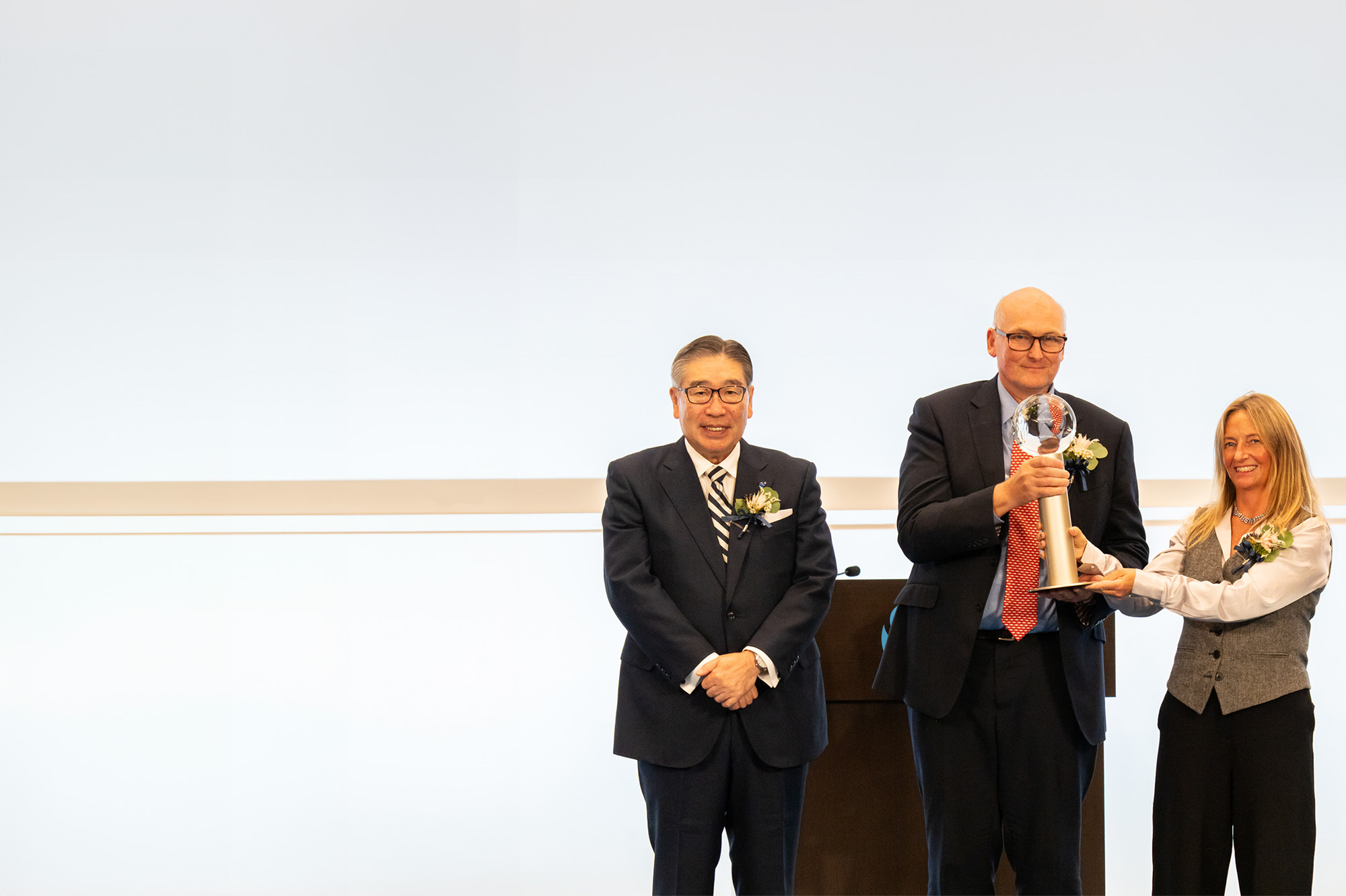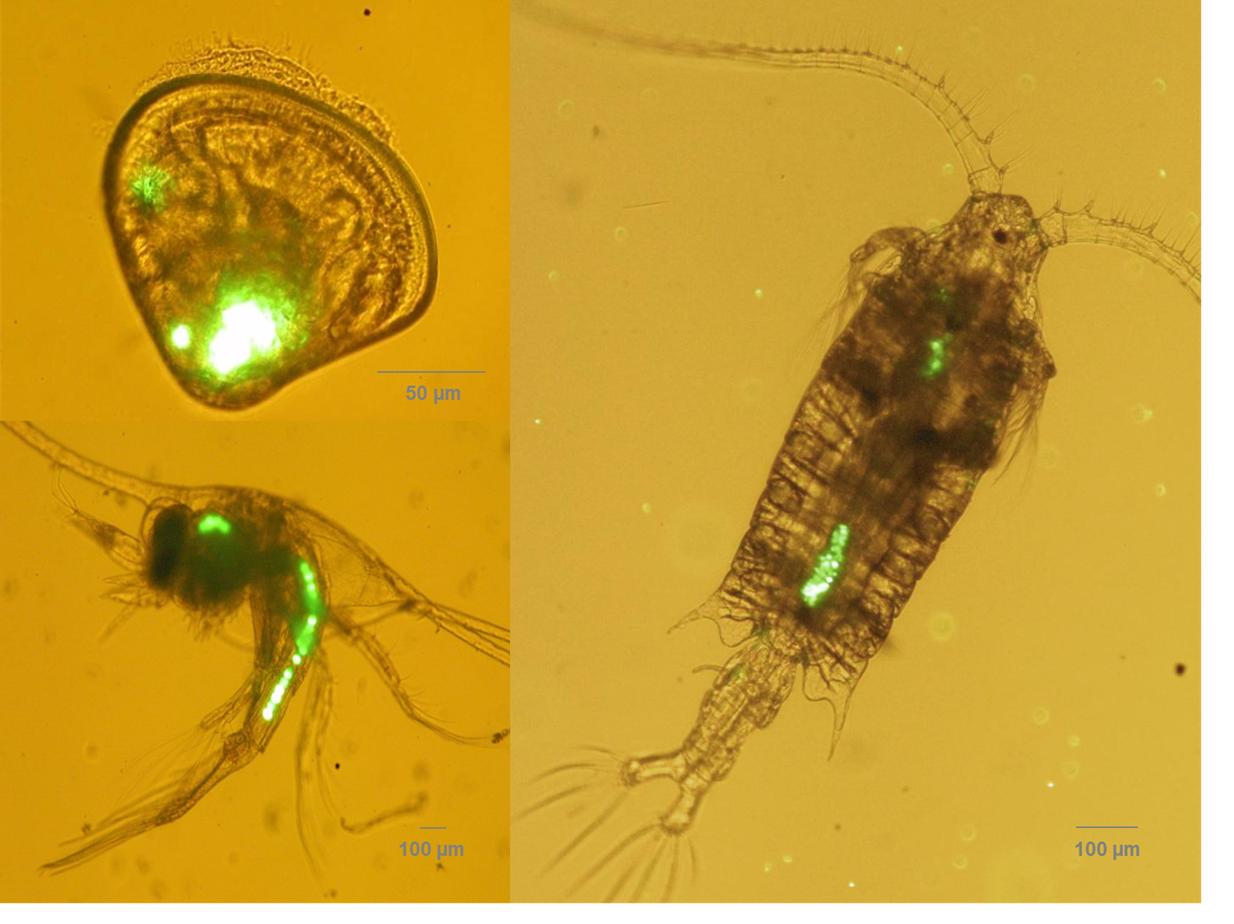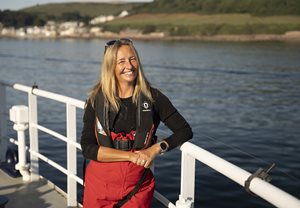Story
PML’s Professor Pennie Lindeque awarded the Blue Planet Prize in Tokyo
6 October 2023
 Above: Professor Lindeque receiving the award alongside Professor Richard Thompson of the University of Plymouth.
Above: Professor Lindeque receiving the award alongside Professor Richard Thompson of the University of Plymouth. Professor Pennie Lindeque travelled to Japan this week as part of a world-renowned trio awarded the 32nd Blue Planet Prize, an international environmental award sponsored by the Asahi Glass Foundation and chaired by Takuya Shimamura, Director of AGC Inc.
Every year, the Foundation selects two winning individuals, groups or organizations who have made significant contributions to the resolution of global environmental problems.
The trio demonstrated the existence of microplastics in the ocean, and have since charted the presence of plastics from the deep ocean to the highest mountains. They revealed microplastics are ingested by zooplankton and other marine species, and have made major advances in understanding the effects of microplastics on a wide range of marine organisms and ecological processes.
 Above: Microscopic photo of Zooplankton that have ingested microplastics. Credit: Professor Pennie Lindeque.
Above: Microscopic photo of Zooplankton that have ingested microplastics. Credit: Professor Pennie Lindeque.
Together, they have influenced global policy, legislation and action, calling on the international community to develop solutions that will help to address the growing problem of plastic pollution in the ocean, and helped inform the United Nations Treaty on Plastic Pollution that was signed by 175 nations in March 2022.
Furthermore, they have also raised public awareness and alerted industry about the dangers of microplastic pollution through television documentaries and other media, policy briefings and high-level presentations.
Before travelling to receive the award, Professor Pennie Lindeque said:
“On Sunday I travel to Japan with my family to receive the Blue Planet Prize, an accolade above my wildest dreams, to say I’m excited would be an understatement.
From attending my local village primary Stoke Gabriel school, and secondary comprehensive King Edward VI Community College, I’ve always just followed my passion for science.
One thing just led to another, and, despite losing both my parents to cancer while still in education, I completed an undergraduate course in Applied Biology at the University of Bath, and a PhD with Plymouth University and Plymouth Marine Laboratory. More recently I have also been awarded an honorary Professorship with the University of Exeter.
Working with the most amazing colleagues I could hope for has meant receiving the Volvo Environmental Prize last year, and now this year, the Blue Planet Prize for our research and influence on the global issue of marine microplastics.
I could never have dreamt of achieving so much. None of this would have been possible without the students, friends and colleagues I’ve had the pleasure to work with over many years, and above all the love and support I have received from my family.
In the words of my parents ‘the girl’s done good’.”
 Professor Lindeque, Head of Science for Marine Ecology and Biodiversity at Plymouth Marine Laboratory, added:
Professor Lindeque, Head of Science for Marine Ecology and Biodiversity at Plymouth Marine Laboratory, added:
"Receiving the 2023 Blue Planet Prize highlights the plastics issue which continues to present an increasing threat to our marine life and ecosystems. As someone who is passionate about understanding the impact of plastic pollution and finding new ways to tackle it, I do believe there are huge opportunities for industry and society to start turning the tide on plastic pollution, supported by science. But, to achieve that, we need concerted action at local, national and international levels, not least in terms of the Global Plastics Treaty that is the subject of ongoing UN talks.”
“Plastic is a huge benefit to society, and we can continue to use it if we are much cleverer in the way we design, use and manage it. Levels of plastic pollution are growing every day, so time is really of the essence if we want to ensure a sustainable ocean for future generations.”
“Receiving the Blue Planet Prize is such wonderful recognition of my on-going work, and that of all my colleagues and students, without whom this would not have been possible. The prize will allow us to continue our important work to evidence the impact of plastic pollution and to work towards more sustainable use of innovative plastics and solutions.”
Professor Thompson, Professor Galloway, and Professor Lindeque are highly influential, with some of their papers having been cited more than 4,000 times, and they rank among the top 0.1% of scientists in the field of environment and ecology according to the ‘Highly Cited Researchers List’ by Clarivate.
This year, more than 180 researchers from 41 countries were put forward for the prize, representing fields including ecology, environmental economics and policy making, and environmental ethics.
This accolade comes less than a year after the trio was awarded the 2022 Volvo Environment Prize for ground-breaking research in understanding the impact of microplastics on marine animals and the environment.
Related information
Read more about Pennie’s research.
Research from Pennie’s team was recently featured in Science.
More infomation about the Blue Planet Prize.